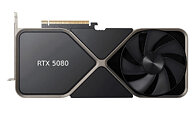- Joined
- Aug 19, 2017
- Messages
- 2,999 (1.07/day)
NVIDIA is preparing to unveil its "Blackwell" GeForce RTX 5080 graphics card, featuring cutting-edge GDDR7 memory technology. However, RTX 5080 is expected to be equipped with 16 GB of GDDR7 memory running at an impressive 30 Gbps. Combined with a 256-bit memory bus, this configuration will deliver approximately 960 GB/s bandwidth—a 34% improvement over its predecessor, the RTX 4080, which operates at 716.8 GB/s. While the RTX 5080 will stand as the sole card in the lineup featuring 30 Gbps memory modules, while other models in the RTX 50 series will incorporate slightly slower 28 Gbps variants. This strategic differentiation is possibly due to the massive CUDA cores gap between the rumored RTX 5080 and RTX 5090.
The flagship RTX 5090 is set to push boundaries even further, implementing a wider 512-bit memory bus that could potentially achieve bandwidth exceeding 1.7 TB/s. NVIDIA appears to be reserving larger memory configurations of 16 GB+ exclusively for this top-tier model, at least until higher-capacity GDDR7 modules become available in the market. Despite these impressive specifications, the RTX 5080's bandwidth still falls approximately 5% short of the current RTX 4090, which benefits from a physically wider bus configuration. This performance gap between the 5080 and the anticipated 5090 suggests NVIDIA is maintaining a clear hierarchy within its product stack, and we have to wait for the final launch to conclude what, how, and why of the Blackwell gaming GPUs.

View at TechPowerUp Main Site | Source
The flagship RTX 5090 is set to push boundaries even further, implementing a wider 512-bit memory bus that could potentially achieve bandwidth exceeding 1.7 TB/s. NVIDIA appears to be reserving larger memory configurations of 16 GB+ exclusively for this top-tier model, at least until higher-capacity GDDR7 modules become available in the market. Despite these impressive specifications, the RTX 5080's bandwidth still falls approximately 5% short of the current RTX 4090, which benefits from a physically wider bus configuration. This performance gap between the 5080 and the anticipated 5090 suggests NVIDIA is maintaining a clear hierarchy within its product stack, and we have to wait for the final launch to conclude what, how, and why of the Blackwell gaming GPUs.

View at TechPowerUp Main Site | Source





